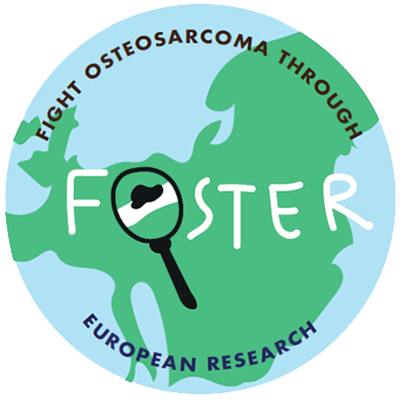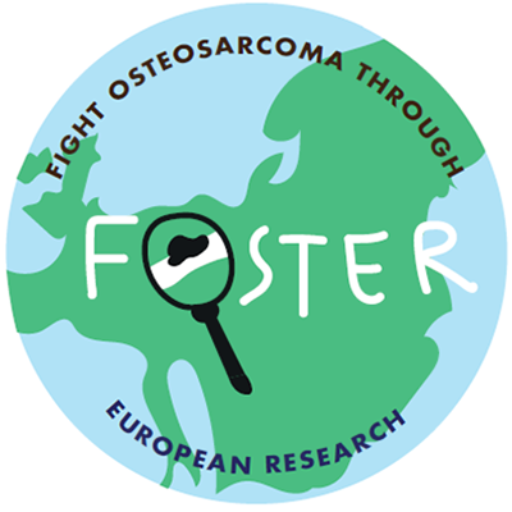Fighting Osteosarcoma Through Research Together
by Jazzmin Huber,
This October clinicians, researchers and patient advocates from across Europe came together for the first in-person FOSTER (Fighting OSteosarcoma Through European Research) meeting. The event was held over two days at the Gustave Roussy Cancer Research hospital in France. The aim of the meeting was to discuss the next steps needed to advance research into osteosarcoma (OS). We are delighted to be part of FOSTER and working with them to make a better world.
In the last 30 years there has been little change to OS treatment or survival. We now have an opportunity to change this through the FOSTER consortium. With 265 members across 19 European countries, we can accelerate research through collaboration.
FOSTER consists of eight work packages. Each work package aims to answer different questions about OS and identify gaps in the current research. During this in-person meeting members of each work package discussed where their focus should be and how to initiate impactful research.
Understanding osteosarcoma
Work package one focuses on understanding the biology of OS. In other words, it will explore why OS acts the way it does and how we can stop it. This laboratory-based research will lay the foundation for future clinical work.
To understand the biology of OS we first need reliable OS models. Disease models allow researchers to see how a disease behaves in real-life, but without looking in humans. There are many types of disease models, and each has its advantages. FOSTER will be reviewing the current OS models to see how representative of human OS they are and if any new models are needed.
Using these models, the researchers will investigate how and why OS spreads. They will also study the tumour microenvironment. This is the area around the tumour. It is made up of lots of different types of cells that can protect the tumour from the body’s defence system. It is hoped that this work will lead to the discovery of new drug targets. This is the first step towards drug development and new clinical trials.
The genetics of osteosarcoma
Work package two aims to better understand the mutations in genes that drive OS formation and growth. By doing so, key genetic mutations can be identified and targeted by drugs.
So far researchers have struggled to find key mutations in OS. This is because it is a very heterogeneous tumour type. This means the genetics of the tumours vary between people and within the same person. FOSTER hopes that by reviewing a large pool of genetic data we may be able to identify common mutations.
Testing new drugs
Work package three focuses on OS that has returned or not responded to treatment. These cancers often have worse outcomes. FOSTER aims to improve outcomes by developing clinical trials that will lead to new drugs being licenced. To do this we first need to learn from previous trials. Work package three are doing a formal review of past trials, which will soon be published. These results will feed into the design and development of future clinical trials.
Importantly there are European OS clinical trials currently in development.
Finding the best treatment
Through work package four, FOSTER aims to create a clinical trial to assess which chemotherapy drugs are most effective in OS. Chemotherapy is the first-line treatment for OS. This means it is recommended as the initial treatment. However, the exact chemotherapy drugs used varies between countries. To find the best regimes FOSTER will first compare data on the different drugs. They will look both at the short-term effects of the treatment and the long-term impact it has on patients’ quality of life. They hope this will lead to a clinical trial which will also provide a platform to test additional drugs as first-line treatments.
Surgery and radiotherapy
Work package five aims to review the effectiveness of surgery and radiation therapy in OS. Surgery is performed in OS to remove the bone tumour. It is normally part of the initial treatment alongside chemotherapy. Surgery is also used to treat OS that has spread to the lungs. In contrast, radiation therapy is not often used in OS. This is because currently, it is not very effective against OS cells. However, new technology means both radiation therapy and surgery are improving. Thermoablation is also a new technique to explore alongside surgery and radiotherapy to treat OS that has spread.
Work package five will firstly look at how well past and present treatments have worked. This will guide future research. Ultimately, we want to ensure that the most effective treatment is offered to patients with OS.
Medical Images
Everyone who is diagnosed with OS will have scans. These scans produce images that can be used for diagnosis, monitoring and research. The images taken can vary between countries. Work package six aims to create guidelines for imaging across Europe. This means images can more easily be compared.
Quality of life
FOSTER want to look further than just the immediate effects of cancer treatment. They want to assess how cancer treatment affects patients’ long term. Work package seven is dedicated to this. The researchers will be working directly with patients to identify their goals. They will then assess how best to support patients to reach these goals. The team will also identify the best way to evaluate how patients are getting on in their post-treatment life.
Sharing knowledge
Work package eight is dedicated to sharing knowledge. This includes regular FOSTER updates, a new website funded by the Myrovlytis Trust and a platform for data. One of the major problems that slows down research into rare conditions is the lack of data. One country is often not able to collect enough data to do meaningful research. Through FOSTER, we can combine data from different countries in a consistent manner. This will help researchers answer many of the unknown questions about OS.
FOSTER also runs regular webinars. Each webinar will highlight the research being done in each European country. This will help us to better understand each other and collaborate more effectively.
The Patient Voice
From the beginning, patient advocates have been involved with FOSTER. Their input provides valuable insight into OS and the areas of research that should be prioritised. However, the patient advocates do not want patient input to be limited to those within FOSTER. They have created a global patient survey. This survey will gather information about patient experiences. The results will help to direct research. The survey is open to everyone who has been affected by OS across the world. Take the survey now.
FOSTER want to facilitate patient involvement in each of the work packages. This means each work package will have at least one patient advocate involved in meetings. The patient voice is so important. Their insight is vital for directing research to where it is most needed.
Young Investigators
A new generation of researchers have been invited to take an active role in FOSTER. They will be mentored by experienced doctors and will be directly involved in the work packages. Although early in their research carers, these young investigators (YIs) will be the future of OS research.
During the FOSTER meeting the YIs identified how they could be supported to maximise their input. This included courses to develop their skills and a newsletter to stay informed. They also suggested a dedicated funding stream for the FOSTER fellows, so that they can have time solely dedicated to FOSTER.
It was also proposed that YIs could be partnered with patients. This could be an effective way to incorporate patients into each work package. YIs would also develop a greater insight into the patient experience, which could positively affect their work.
Being part of FOSTER fills us with hope. It is an opportunity to come together, advance research and ultimately improve outcomes for people with OS. We look forward to seeing what the next few years will bring.

Contact us
Gustave Roussy
114, rue Édouard-Vaillant
94805 Villejuif Cedex - France
+33 (0)1 42 11 42 11
Information
The Objectives
The Parents & Patients
The Work Packages
News
The consortium
The research
The parents & patients
Links
Accessibility
Cookies
Terms and conditions
